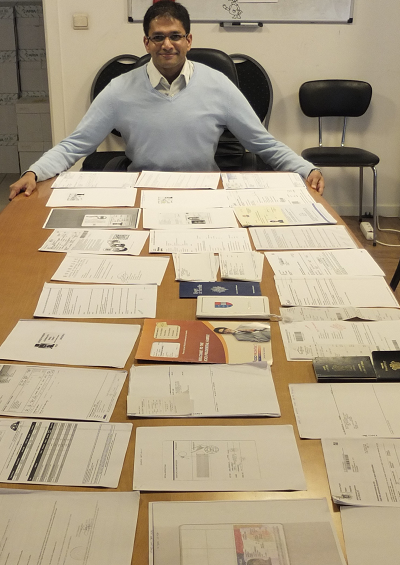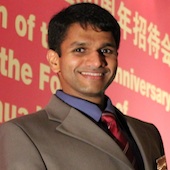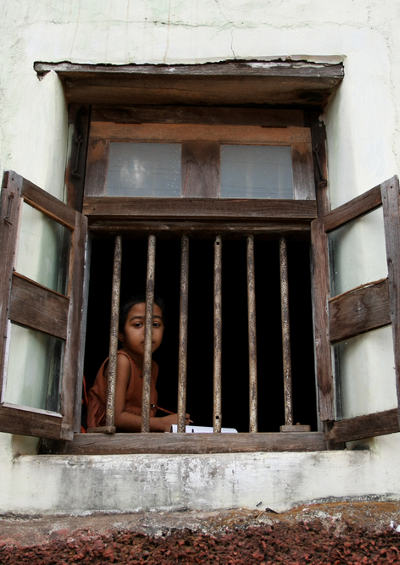India to the World: Visa Reciprocity, Please?
Should nations engage in visa wars or just practice fairness?
November 30, 2014

It seems that sometimes, all you need to do is ask and you shall receive.
Days after Stephan Richter’s article, describing the hoops foreign visitors to India have to jump to get a visa, Indian authorities expanded a visa-on-arrival scheme to include 43 countries – among them Australia, Brazil, Germany and the United States.
The liberalized visa regime will eventually be extended to 180 countries, aimed at helping India improve its dismal record in attracting international tourist visits.
As a proud Indian and a believer in efficient processes, I cannot be happier for my foreign comrades. Bravo, I say.
But before we hand out congratulatory high-fives all around, may I be so audacious as to point out something? I’m confident I speak on behalf of all Indians when I do so.
I’m talking about the simple, time-honored concept of reciprocity and, more specifically, the lack thereof.
The world may be becoming a global village. And, indeed, people may be travelling beyond borders more than ever before.
But let’s not fool ourselves – for many, there are also more bureaucratic barriers to international travel than ever before. It’s just that those who can travel easily have been too busy taking their privilege for granted to notice.
It all depends on where you’re from
We live in a world where if you’re lucky enough to be born in the right place, you can pretty much waltz into any country that tickles your fancy. But, heaven knows, if you’re from the developing world, you don’t have the luxury of being as spontaneous.
Even as the Modi government seems to be moving full steam ahead in implementing reforms that will benefit foreigners visiting India, for many Indians these countries cannot take reciprocal steps soon enough.
For the curious, if you don’t hail from a rich country, there is an all-too-familiar-yet-ever-strenuous process before being allowed to set foot abroad.
The following are some of the standard documents one needs to compile:
– travel itineraries
– hotel reservations
– invitation letters
– official letters of undertaking
– proof of insurance
– recent salary documentation
– bank statements
– tax clearance certificates
– letters from your employer
– your host’s immigration, employment and financial details
Indeed, the supporting documents checklist can be virtually endless.
If you’re really lucky – like me – you’ll even be asked to provide police clearance certificates. That’s where the rule of thumb “innocent until proven guilty” is thrown out of the window. The fact that even to this day one is presumed to be a criminal until you produce documents from the police stating otherwise beggars belief.
The dirty four-letter word
Why all the trouble? It all boils down to the dirty four-letter word: visa.
In the developing world, visas are accepted as a fact of life. In countries like India and China, the quest for this necessary evil has spawned an entire industry of agents and advisors who collect and push your papers for you.
People spend less time asking why they need to go through the colossal pain and more time wondering how best to fulfill ever-stricter requirements. It can strike us as unfair, humiliating and a bureaucratic nightmare, but we try (as far as possible) not to take it personally.
Many have the art of visa applications down to a science. Yet there’s always a lingering tension – will you get your visa or won’t you? All sorts of worries, some more rational than others, plague your mind.
Is your bank balance big enough? Will some mean-spirited visa officer who had a bad breakfast that morning or a fight with the spouse the night before take it all out on your application? Will you end up becoming a sorry statistic? After all, embassies must have rejection targets, too.
If the anxiety fails to age you horribly, the treatment meted out to you in embassies never fails to make you feel like a worm and/or a fool for wanting to set foot in another country.
Nevertheless, the drama is considered part of the buildup to any trip abroad. Should you get your passport back with a shiny visa sticker in it, you rejoice, pump your fists in the air and praise the lord.
Nothing makes you cherish a journey more than an arduous visa application process. Any one from the developing world will tell you so.
If you are denied a visa, however, you hope and pray that the embassy staff don’t add insult to injury by treating you like dirt while returning your passport.
Are current visa rules for people from developing countries reflective of a changing global reality? While illegal emigration is a legitimate global concern, should tourist visas be as big a problem?
Despite the recent slowdown, countries like China and India boast GDP growth rates that debt-ridden Europe and the United States can only dream of.
Global travel: A right or a privilege?
Inflation and equitable distribution of wealth remain major challenges. Yet the middle class in emerging nations is expanding quickly, as is their disposable income. A culture of being thrifty also means developing country folks often have substantial savings stashed away for a rainy day.
Emboldened by this economic progress, emerging nations are slowly but surely flexing their muscles on the global stage. They are certainly less tolerant when pushed around.
A case in point: after the United States removed Brazil from its visa waiver program, Brazil returned the favor in 2004 by demanding visas from and fingerprinting visiting U.S. citizens.
In late 2010, the UK decided its embassy in Brussels would no longer entertain visa applications from people living in Belgium, directing them to Paris instead. So India reciprocated half a year later by refusing to process visas for UK nationals in Belgium, directing them to London instead.
As of mid-2014, the UK restarted accepting visa applications in Brussels — in an office open two mornings a week and with an additional cost of 75 euros.
Are such tit-for-tat measures the solution? Not in the long run, since they would lead to protectionism and be detrimental to growth.
But in the short term, it seems to be giving more and more first-world citizens – many of whom are amusingly clueless about the concept of visas – their first taste of travel bureaucracy.
It can come as a rude shock. Even a reminder that something they might have confused over time for a right is, in fact, a privilege.
You think you have it bad?
Most from the developing world would find the “retaliatory” visa process for first-world citizens a joke since it’s largely a formality and not even a fraction of the pain they go through.
For example, if your country isn’t yet part of India’s e-visa scheme, all that’s basically asked is a valid passport, local residence card, completed application form, photos and money.
Though, lately, Indian visa centers abroad are demanding proof of residence dating back two years, which is tough when you’ve just moved to a new city. And if you happen to be a journalist, things can take longer even if your trip is purely for pleasure.
Still, when those from the first world complain when they apply for visas, it can be fascinating for people from the developing world. Do they really expect sympathy?
“I just paid 53 euros for my visa to India. What the deuce?!” Well, it’s 60 euros in India for a Schengen visa, not mentioning how much time and money I spend to put together all the supporting documents.
You mostly get a 90-day Indian visa, while I’m likely to get one valid for exactly the number of days I can prove I have accommodation in Europe.
The UK makes no apologies for their overtly money-driven visa policies. Their cheapest visa is 110 euros. For the United States, you are charged a flat US$160 and can be given up to a 10-year multiple-entry visitor’s visa, if your papers are in order. However, the UK has stratified fee bands with its 10-year visa costing a cool 973 euros or US$1,215.
It’s clearly all about the money. So does 53 euros still sound bad?
“They asked my mother’s maiden name for my visa application. How ridiculous!” Yeah, the nerve!
When I applied for a U.S. visa, I had to list not just my parents’ names but also their birthdays, mention every asset I owned, every job I’ve had, every country I’ve ever visited, etc, in a form 15-pages long. But they asked you your parents’ names? What is the world is coming to?
The real outrage
To be fair, one cannot blame first-world citizens for not knowing about something they’ve never had to deal with. And it is indeed a pity that the innocent invariably get caught up in the diplomatic crossfire between two worlds.
Not to forget, things are slowly but surely changing for Indians as well, with up to 50 countries and territories now offering us visas on arrival. France recently announced it would open 8 new visa centers in India to process applications within 48 hours. One can only hope more nations follow suit.
In the interim, however, rich country folks who count their blessings instead of complaining about having to get visas gain my respect.
Those who realize their visa application process is still a cakewalk, not a tightrope, are true global citizens.
Travel-related bureaucracy may never fully disappear, so we all might as well get used to it.
For now, however, some are more equal than others. It’s only an outrage if first-world citizens find it difficult to apply for visas to developing countries and not vice-versa.
Perhaps it’s only an outrage when it happens to you.
Takeaways
Is it only an outrage if first-world citizens find it difficult to apply for visas to developing countries?
For many people, there are also more bureaucratic barriers to international travel than ever before.
Things are slowly changing for Indians, with up to 50 countries and territories now offering them visas on arrival.
How about the simple, time-honored concept of reciprocity?

